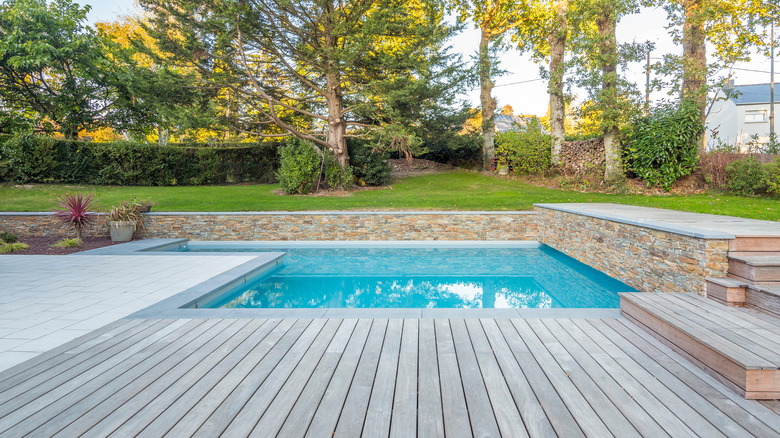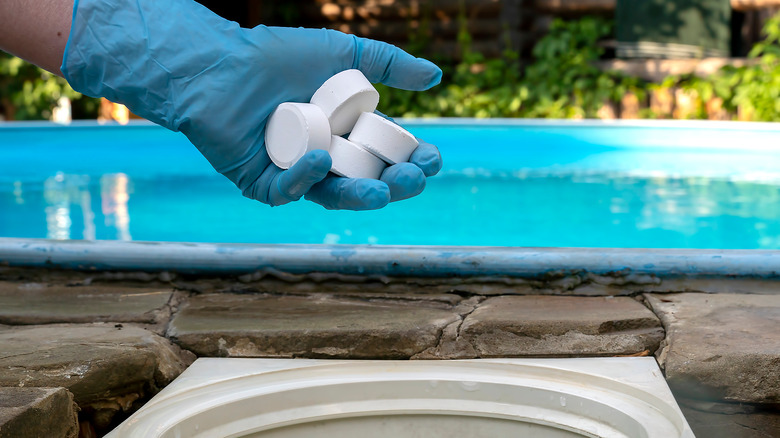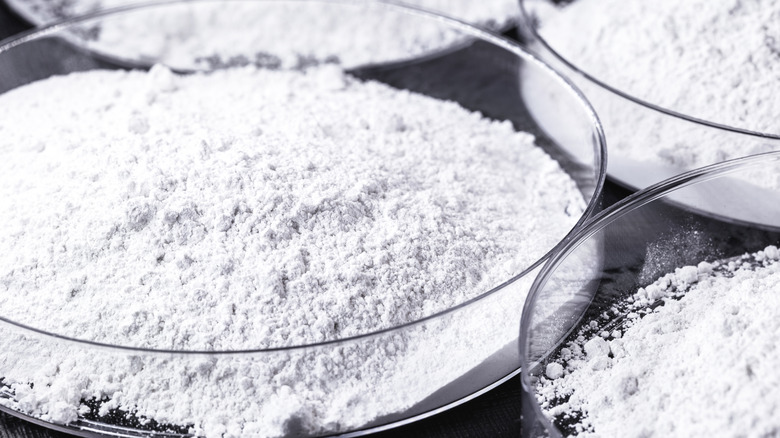The Right Way To Dispose Of Pool Chemicals
Residential swimming pools, hot tubs, and spas serve as a welcome oasis for almost 20 million Americans. But they are also a breeding ground for bacteria, viruses, fungi, algae, parasites, and organic debris. Without chemicals used to sanitize the pools, these nasties would run rampant. But what to do when you need to safely dispose of your chlorine, algaecides, shock treatments, and water clarifiers? There are several safe ways to get rid of them, and regulations you must adhere to.
The substances used to disinfect and balance the pH levels of pool water are considered to be household hazardous waste materials, according to MLi Environmental. Careless handling, storage, or spillage of those chemicals is potentially dangerous. Chlorine, in particular, should be treated cautiously. It can cause lung irritation and burn your eyes and skin. It is combustible, and improperly mingling it with other materials may result in a fire or generate toxic vapors, warns the EPA. Chlorine is so volatile that it will instantly react when exposed to body moisture.
Pool supplies cannot simply be treated casually and must be discarded meticulously. Failure to follow proper procedures is a potential threat to yourself, trash handlers, wildlife, landfills, and the environment. Pool chemicals can foul groundwater, compromising our drinking water supply. A violator might even face legal consequences.
Disposal procedures to follow
How-To Dispose emphasizes that chlorine and other pool chemicals should not end up in your household trash or be recycled under any circumstances. You should never flush them down the toilet or dump them on the ground. Your local waste hauler may not be trained, certified, insured, or even willing to dispose of the hazardous material. Instead, contact your local solid waste authority to determine how best to proceed. They can provide the necessary guidance and might have the facilities and personnel capable of dealing with your chemicals on-site. A recycling search tool is a good resource too.
Communities often offer hazardous waste drop-off services, collection events, or curbside collection. Your local pool supply store or community pool are other options — they may be willing to take your detritus and dispose of it with their own waste. A neighbor with a pool or hot tub is someone who might also accept your excess chemicals. Sunplay suggests dumping outdated chemicals into the pool itself, as long as appropriate fresh chemicals are added as well. When storing or disposing of pool chemicals, always wear gloves and a safety mask. Make sure containers are intact, or use a hazardous waste receptacle or doubled plastic bags when handling. Empty bottles and lids typically will end up in the trash, as hazardous waste facilities will not accept them for recycling.
Safer alternatives to traditional chemicals
Always remember that the pool chemicals that protect you from hepatitis, pink eye, E. coli, giardia, and swimmer's ear can also injure you. In a given year, upwards of 5,000 Americans will seek emergency treatment for injuries caused by the chemicals, per Comfy Living. There are some safer alternatives to chlorine, although they, too, have some drawbacks. Chlorine may still be needed in some cases to fully sanitize and balance your pool or tub.
Baking soda (sodium bicarbonate) can be used to raise a pool's pH level. Per Houselogic, bromine is another useful option. It will sanitize water but is not effective in controlling organic matter. It is available in tablets that are ⅔ bromine and ⅓ chlorine and is favored by those who are allergic to chlorine. Alternatively, an ionizing device using a low voltage current and an ozonator to introduce ozone gas into a pool or tub can be used to purify water without adding large amounts of chlorine. According to Comfy Living, there is only one way to eliminate the need for chlorine completely: with PHMB, a bacteria-destroying agent. However, a pool must be drained completely to get rid of any trace of chlorine before it can be used.


